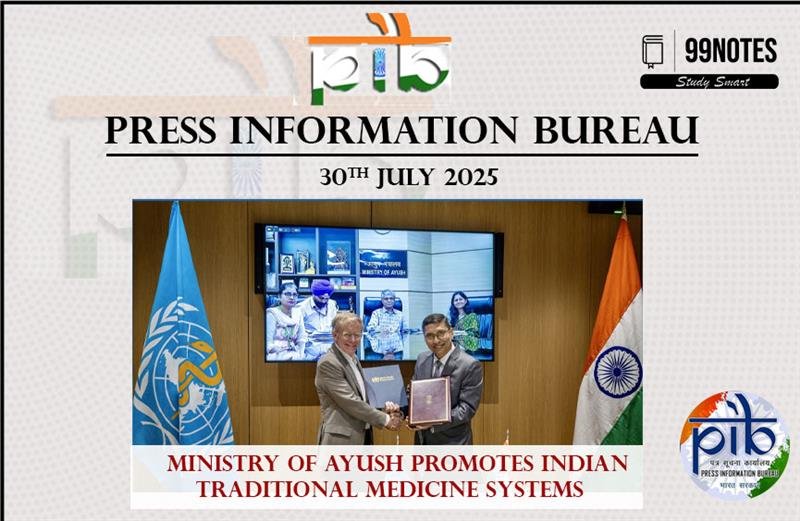30 July 2025: PIB Summary For UPSC
1. Ministry of Ayush Promotes Indian Traditional Medicine Systems Globally with WHO Agreement, Academic Collaborations, and Export Promotion Initiatives
Source – Press Information Bureau (PIB) – Ministry of Jal Shakti (30 July 2025)
|
Topic: GS Paper 2 International relations (India‑WHO cooperation) & GS Paper 3 – Health sector initiatives, traditional medicine & export promotion. |
|
Context |
|
Content:
Background
-
AYUSH systems have gained global interest for preventive and integrative healthcare.
-
The Government of India aims to strengthen this through MoUs, export promotion schemes, and institutional partnerships.
Key Developments
● WHO Collaboration – Establishment of Global Traditional Medicine Centre (GTMC)
-
Agreement signed on 24 May 2025 to set up WHO‑GTMC in Jamnagar, Gujarat.
-
GTMC to act as a global knowledge hub for evidence‑based Traditional, Complementary and Integrative Medicine (TCIM).
● IC (International Cooperation) Scheme
-
Central Sector Scheme promotes international ties for AYUSH: export facilitation, market development, academic exchanges, and stakeholder engagement.
● MoUs and Academic Collaborations
-
Signed 25 country‑level MoUs and 52 institute‑level MoUs with foreign universities and research centres.
-
15 AYUSH Academic Chairs envisaged abroad to promote scholarship and research.
-
43 AYUSH Information Cells established across 39 countries for dissemination and promotion.
● Scholarships & Capacity Building
-
International AYUSH Fellowship/Scholarship Program enables foreign students to pursue study in Indian AYUSH institutions.
Significance & Analysis
-
Soft Power Diplomacy: AYUSH bolsters India’s cultural diplomacy and normative influence.
-
Health Diplomacy: Promotion of traditional medicine aligns with WHO’s global health strategy, contributing to universal health coverage.
-
Economic Diplomacy: Export incentives and global branding open new markets and economic gains.
-
Institutional & Research Linkages: Academic Chairs and GTMC enhance global credibility for AYUSH; fosters evidence‑based integration.
-
Global Standards & Terminology: Published WHO terminology for Ayurveda, Unani, Siddha systems supports cross‑border acceptance and regulatory clarity.
Conclusion
-
Focus on rigorous clinical validation, quality assurance, and standardization to enhance acceptance.
-
Scale up GTMC operations in research, policy advisory and capacity building.
-
Extend academic collaborations to regions with rising health interest, e.g. Africa, Latin America, Southeast Asia.
-
Strengthen export regulations and certification to maintain global standards and foster market trust.
-
Encourage domestic AYUSH firms to upscale production and comply with international quality norms.
|
Practice Question: “Discuss how India’s collaboration with the WHO and global academic institutions to promote AYUSH is enhancing its soft power, health diplomacy, and economic diplomacy. What challenges might India face in internationalising traditional medicine systems, and how can these be addressed?” |
Check this out 29 July 2025: PIB Summary For UPSC


